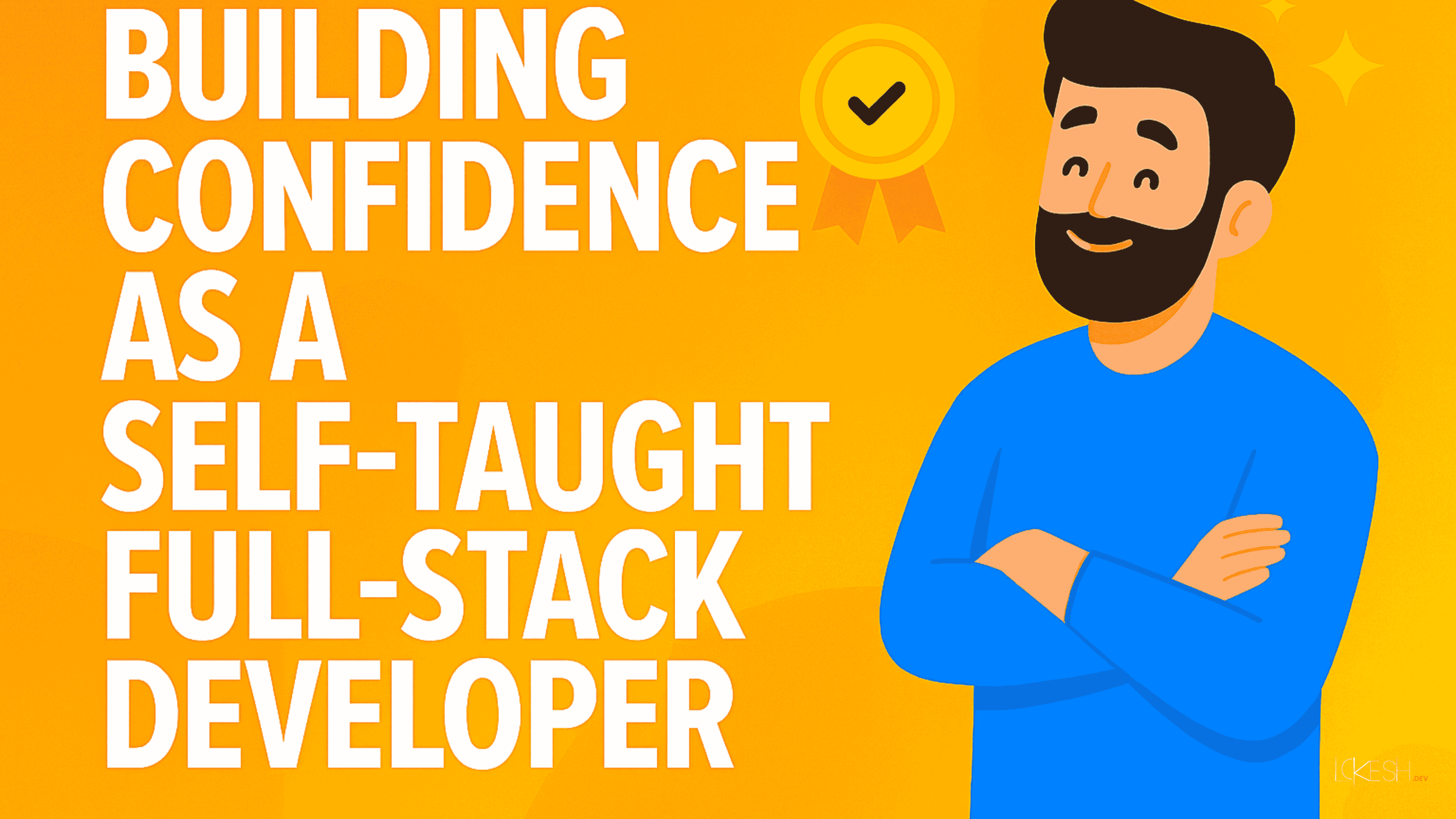October, 08 2025
Building Confidence as a Self-Taught Full-Stack Developer

By ~ Lokesh Raikwar
Introduction: The Self-Taught Developer’s Journey
In today’s world, you don’t need a computer science degree to become a successful full-stack developer. Thousands of developers have built careers through self-study, online courses, coding bootcamps, and project-based learning. However, one of the biggest challenges self-taught developers face is not the lack of knowledge, but the lack of confidence. Without formal credentials, many struggle with impostor syndrome — the belief that they are not 'real' developers. Confidence plays a critical role in whether you apply for jobs, pitch freelance clients, or contribute to open-source projects. This blog explores how to build and sustain confidence as a self-taught full-stack developer by focusing on skills, mindset, and practical strategies. It’s not about pretending to know everything; it’s about recognizing your progress, owning your journey, and proving your value through real-world work.
Why Confidence Matters More Than Credentials
Tech hiring is evolving rapidly, and companies today care more about what you can build than where you studied. Confidence is the bridge that allows you to showcase your skills effectively. Even if you know React, Node.js, PostgreSQL, or Docker, hesitation can hold you back from applying for roles or speaking up in interviews. Confidence also affects how you present yourself in resumes, portfolios, and GitHub projects. A self-taught developer who believes in their skills is more likely to demonstrate projects, explain decisions, and highlight achievements. Confidence is not arrogance; it is clarity about what you know and honesty about what you are still learning. Many successful developers have unconventional paths — some studied art, business, or even completely unrelated fields before becoming engineers. What sets them apart is their ability to show confidence in their journey. Employers value problem solvers, not just degree holders, so building confidence is crucial for career growth.
Practical Ways to Build Confidence as a Self-Taught Developer
Confidence doesn’t come overnight, but there are practical steps you can take to build it. First, focus on projects instead of tutorials. Building real applications — even small ones — demonstrates your ability to apply knowledge. For example, creating a blog app with a React frontend and Node.js backend shows practical full-stack skills. Second, contribute to open-source projects, even in small ways like fixing documentation or improving CSS. This exposes you to real-world workflows and gives you proof of contribution. Third, showcase your work publicly through a personal portfolio website or GitHub repository. Seeing your progress in a tangible form boosts self-belief. Networking with other developers through forums, LinkedIn, or local meetups also helps normalize your journey — you realize that many developers feel the same insecurities. Lastly, keep a 'progress journal' where you track what you’ve learned weekly. Reflecting on growth makes it easier to see how far you’ve come, which naturally builds confidence.
Overcoming Impostor Syndrome in Full-Stack Development
Impostor syndrome is one of the biggest hurdles for self-taught developers. You might feel like you don’t belong in a room full of computer science graduates or senior engineers. The truth is, every developer — even experienced ones — has felt this at some point. The key to overcoming impostor syndrome is reframing how you think about learning. Instead of focusing on what you don’t know, focus on what you can do. Remember, full-stack development itself is vast; no one knows everything. Even senior engineers Google solutions daily. Another strategy is to celebrate small wins. Did you deploy your first app? Did you fix a bug after hours of frustration? These are achievements worth acknowledging. Surround yourself with supportive communities where people share struggles, not just success stories. Impostor syndrome thrives in isolation, but it loses power when you realize others are facing the same doubts. Confidence grows when you replace self-doubt with evidence of progress.
Conclusion: Owning Your Self-Taught Path
Being a self-taught full-stack developer is not a weakness — it’s a strength. It shows resilience, discipline, and adaptability. Confidence doesn’t mean pretending to know everything; it means embracing your learning journey and trusting that you can figure things out. The tech industry values skills and results, and your ability to build applications, solve problems, and learn independently is proof of capability. By building real projects, sharing your work, connecting with peers, and reframing impostor thoughts, you can develop lasting confidence. Remember, the best developers are not defined by their degrees but by their ability to keep learning and delivering value. In 2025 and beyond, companies will continue to reward developers who can adapt, communicate, and solve problems creatively. So own your journey — confidence will not only make you a better developer but also open doors to opportunities you once thought were out of reach.
Get in touch
We answer quickly. Subscribe for updates or reach out directly.
Let's stay in touch
Based in
![]() Delhi, India
Delhi, India
